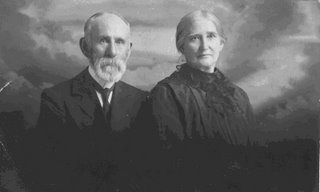I thought yesterday might bring the conclusion of our ‘Law, Legalism, and Life’ series, but my sister made a suggestion that will extend the series by one week.
This week, our subject is ‘Separation from the World‘. The sermon is a culmination of all that went before.
In the series, we established that the Christian church has always called for morality and holiness in its people (with varying degrees of success). It is true that mistakes have been made in application, but the energizing spirit behind the call for holiness is the Spirit of the Lord. Those who decry standards of holiness today are the innovators.
Our intent has been to uphold salvation by grace alone and not to impose a new structure of law on the Christian church. Rather, we want to establish minimum standards of conduct as a guide (and a goad) on the path to perfect holiness, the goal of Christian life. [And our expectation is that none of us will achieve that goal in this life – but we will die trying.]
We offered seven reasons why Christians should proclaim and practice standards of holiness in Christian living:
1. There is such a thing as behaviour that pleases God
2. The fact is, faith is more than just your ticket to heaven
3. The operation of God’s grace in a Christian life tends towards godliness (Tit 2.11-12)
4. The notion of lawlessness is incompatible with Christianity
5. The liberty part of Christian liberty means ‘set free’, not ‘self serve’
6. The Christian mission is ultimately tasked with the discipline of discipleship (Mt 28.19-20)
7. The nature of Christianity is that its people are subjects of The King
This brings us to Separation from the World. Our text was 1 Jn 2.15-17.
In this message we defined the world as the value system and philosophy of men without God. I noted that our text calls us not to love this world, neither the things in this world. The phrase ‘in the world’ here bears some resemblance to Paul’s phrase, ‘in Christ’. Just as the believer is ‘immersed in Christ’, made a wholly new man, under new lordship, and so on, just so the ‘things in the world’ are immersed in the world system and are thus affected by its values and thinking.
It is important to recognize that the ‘things in the world’ as defined in 1 Jn 2.16 are actually ‘outside’ of us, they are things in the world. One of the complicating factors in understanding the passage is that we recognize these things as also being in us, that is, in our old nature. The apostle’s focus here is not on us, however, it is on the world. We are not to love the world nor the things-in-the-world. They are dominated by a world-system opposed to God. So for example, we have these kinds of things ‘in the world’:
- The sex-saturated advertising world – almost every product you can imagine is sold somewhere with subtle (or very unsubtle) suggestions of illicit sexuality.
- The sex-saturated music world: sexuality saturates the driving beat, the sensuous mood, the sultry sound of almost all modern music.
- The earth-centered world of myriads of possessions…
- The ego-saturated business world, housing market, political world, etc.
There are things in the world that are just things. No inherent moral value involved… just things. But the world system takes those things and invests them with its values, creates a culture around them that makes them worldly. For example:
- Skiing – just a thing, not worldly, it is just an activity; but the ‘ski-bum’ culture, the partying, the immorality, the ‘playboy’ mentality; that is the world taking something and making it its own.
- Biking – just a thing, an activity, no inherent evil in it; but the ‘biker’ culture surrounding it, the loud driving music, the dress, the attitudes, the drugs [often, not always], the language; that is the world taking something and making it its own.
- Clothing – just a thing [and a necessary thing]; but the culture of fashion [whether high fashion or low grunge fashion] becomes the world taking something, investing it with sexuality or rebellion, and making it its own.
Worldliness is simply a mindset that loves the world and its things. This is wrong for a Christian for several reasons.
First, because God commands us not to love the world.
Second, because worldliness is evidence of no love for God – ‘the love of [for] the Father is not in him’ [an extremely sober possibility for a Christian].
Third, because worldliness wastes a life that could have been lived for eternal things on temporal things (1 Jn 2.17).
Fourth, because worldliness is a betrayal of Jesus Christ (Jas 4.4).
Our response to worldliness should be to flee: flee worldly lusts (1 Tim 6.10-11, 2 Tim 2.22). We should understand the world’s strategy to pressure our conformity, but we should not give in. We should instead live as ambassadors for Christ in a broken, failing, and sin-sick world.
~~~
In our Bible study time, we devoted our efforts to a discussion of Separation from the World and Christian standards in two categories: How we dress and Church attendance. Next week we will touch on Music, then on topics our people bring up.
~~~
For our afternoon service, Rory preached his last message of the summer on the topic Christian Runners from Heb 12.1-3. He admonished us to lay aside the weights and sins that hinder our Christian race and to follow Christ, enduring the difficulties of the race for the glory of God. His message was a great complement to our study in the morning and a welcome admonition for our lives.
Tomorrow he and Susan head off for school again. I do look forward to the day when there is no more leave taking and we will all stand perfected in the presence of the King.
Regards,
Don Johnson
Jer 33.3

Comments